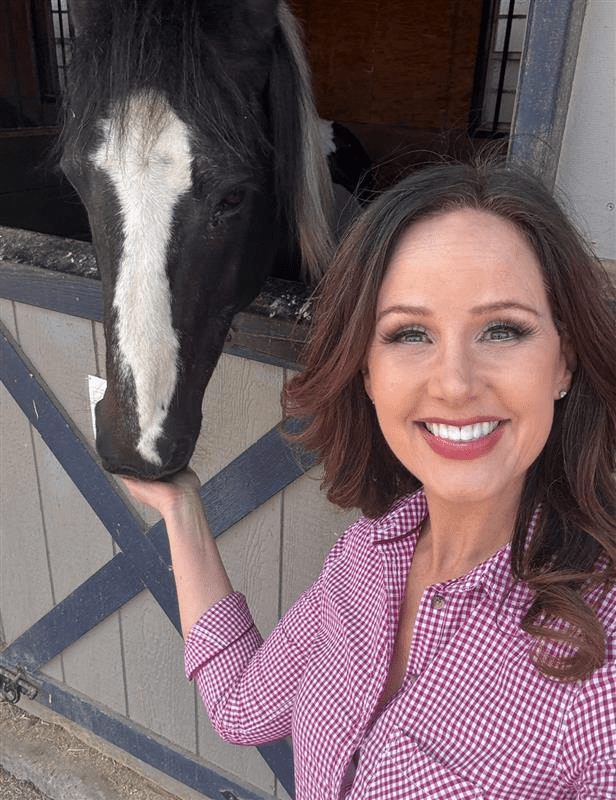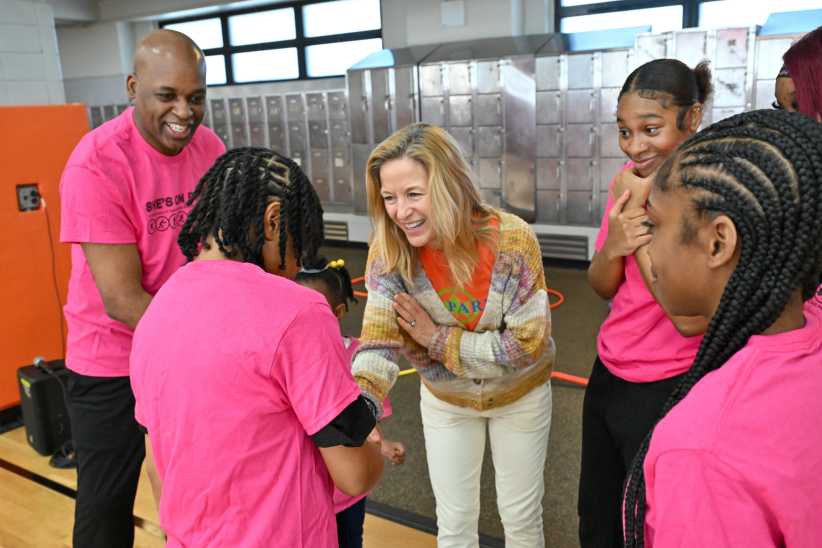Three years ago a friendship was forged in a freight elevator. Chelsea moms Alison Qualter Berna and Allison Schlanger, both mothers of twins, were taking a parent/child music class in an office building that was about as kidunfriendly as it got. There wasn’t even a place to change or feed their children. But that experience, stressful as it was, planted a seed. Though more and more families were settling in their neighborhood, there was a scarcity of children’s play spaces and programs to support them. So Alison and Allison, feeling the need themselves, decided to try to remedy the situation. Joined by their husbands, Bobby Berna and Craig Schlanger, they started with the idea of an indoor playground and ended up with apple seeds, a flourishing children’s enrichment and activity center that, in two quick years, has become a pillar of family life in the Flatiron-Chelsea-Murray Hill area.
Prior to apple seeds, each of the four had thriving but separate careers: Alison Qualter Berna managed a UNICEF development program focused on sports and play; Allison Schlanger was an executive producer at MTV; Bobby Berna was a business development executive working with start-up companies; and Craig Schlanger was a NASDAQ trader. Today, the two career-driven couples work full-time on raising their “third baby,” which includes an award-winning indoor play space for the 5-and-under set; children’s classes in music, science, yoga, cooking, soccer, art and dance, among other subjects; a children’s boutique and bookstore; and a small hair salon and snack bar. “May 2006 was our first meeting, and we opened up March 1, 2007—it was like the length of a pregnancy. It was likegiving birth,” says Qualter Berna.
Yes, but to a whole community.
Who came up with the name apple seeds?
Bobby Berna: My dad
actually came up with it.
What was the runner-up?
Allison Schlanger: We had
Chelsea’s Playground, The Playground, Mini-City, Double Happiness. Craig
Schlanger: They all stink when you think about it. Alison Qualter
Berna: One thing that we really love about it is that kids can say it.
Kids walk out of here and they are barely talking but they are saying
“apple seeds, apple seeds.” And it starts with an A. CS: Which is good
because let’s say you are looking up birthday parties—apple seeds
usually comes first.
BB: My dad was a secret marketing genius.
This is such a family affair— two families,
four parents, two sets of twins—how do you all make it work? Is there
room for disagreements? Power struggles?
AQB: We all respect each
other’s ability to make decisions, and fortunately we blend extremely
well in our skill sets. Working with your husband, which I can talk
about, is a little different than working with your best friend, and
Allison, hands down, is my best friend. I remember when we were walking
down Fifth Avenue before the business opened and Allison said to me if
this doesn’t work out, can we still be best friends? And I remember
feeling I love this person, because I was thinking the same thing. But
what’s actually happened in the last two years is that our friendship
has deepened. Every working mom has this impossible balancing act, but
we now have this situation where work not only often means having our
children nearby, it also means being there for each other when things
start to go off balance.
BB: Also, we basically agree on a lot.
Usually there is not a lot of “but I feel this way.”
We are on the same page with a vision, and because of that everything
seems like a pretty obvious decision. AS: Right, it is just fine-tuning
and convincing each other on little things.
CS: And we defer on
different issues. If it’s something related to classes and what’s good
for the community and what moms want, Allison and Alison make those
decisions. If there are business decisions or vendor deals, me
and Bobby are going to make those decisions. So while there are
individual decisions, we kind of all have our own roles, and we defer to
each other when we need to. And no one makes unilateral decisions.
AS:
Here’s the interesting part: Between building a business and raising
two kids, we kind of dropped out of our social life for a while and
became each other’s main source of social life. But because we enjoyed
being around each other so much, it made it possible to make the
business move at lightning speed.
What about
complications related to working with your spouse?
CS: I think it’s not as
dramatic as people might think.
The only real issue that I would
say is that sometimes when we are not at work but one person’s brain is
still there— that’s the drama. At work, we have separate projects to
work on—and it is great to have your wife next door, have your kids stop
by. It’s great to have a blend of family and work.
AQB: And it can
blend nicely at home too. When you do go home you aren’t talking about
things in a vacuum because you both care about it and you talk about it
with the kids because they care about it too. Our kids inform us half
the time about what we should be doing.
Recently apple
seeds celebrated its 2nd birthday, and yet it hums with so much child
energy and activity it has the feel of a more established center. Is it the vision you had hoped for?
AS: Originally, our dream
was an indoor playground. We lived near Madison Square Park, and when
the weather wasn’t good, there were very few places to go besides other
people’s apartments. And it evolved from there.
AQB: We loved
the idea that you can go to a community space and your kid can run more
than 100 feet away from you without you panicking, and knowing that they
are safe. A place where you can spend a whole day with your kid. BB:
There were music classes there, art classes here,
AS: It also helped that we
found this great space. We wanted a view and proximity to the park and
also proximity to our homes. It is about equidistant to where Craig and I
and the boys live, and Alison and Bobby live with the girls. It’s
our community. It is exactly where we wanted to build something.
BB:
The two-block commute also was great.
In our experience,
New York City parents will speak up if they’re not happy about
something. Given that you were all new to this business, has there been a
big learning curve?
AQB: You can’t please everyone of course, but you can
listen, and I think we all went into this feeling that we represent the
parents in our community because we are those parents too. But certainly
none of us had run a business before, so one of the most interesting
things to learn was how many policies needed to be created. And just
when you think you understand every curveball that is going to be thrown
at you, you get a new curveball.
What’s an example of a
necessary policy you hadn’t foreseen?
AS: We opened in March and
all of a sudden we hit the summer and everyone was walking around in
flip-flops and was going barefoot into the playground and we were like,
that isn’t very sanitary.
So what’s the policy?
AS: Socks!
Is there anything you’d like to improve upon at apple seeds?
AS: More space for
strollers.
What kinds of classes do new parents in
particular gravitate toward? Like during the first year? What about when the kids
are between 1 and 2?
AS: New parents gravitate toward music and
movement— you can truly enjoy those classes with your child, you are
both involved. It’s amazing to watch your child shake an instrument for
the first time, attempt to climb stairs…by the time they are 18
months-old, they are capable of doing so much more— art, ballet, and
parent/child playgroups are very popular.
Can everyone
share their one favorite thing about the place?
CS: I think we would all
say the same thing: our music class, Songs for Seeds [All four nod in
agreement]. All four of us are music fans, and our kids love music, and
they [Allison and Alison] met in a music class, and I think we’re just
very proud of what Allison and Alison accomplished in overseeing the
creation of Songs for Seeds.
So what exactly is Songs for Seeds?
AQB: First, we have to
talk about Mr. Ray. He is such an incredible children’s musician and he
wrote the music for the program, which offers a little bit of
everything, especially interaction. We wanted to not only focus on
performance for children but interaction with children with a fun,
modern approach to it. With the help of the staff, Allison and I wrote
the curriculum, and it was probably the most challenging thing I had
ever done in my life—leaps and bounds harder than starting a business
because of the fact that you have to compound everything into a
45-minute period and make it good.
AS: We have three teachers per
class—a guitarist/lead vocalist, a pianist, and a drummer, and we have
three sets of musicians, so nine musicians in total. We’ve got nine
stars. It’s so much fun. It’s our children’s favorite class too,
and they are the best judges.
Speaking of all those
twins, what have been some of your greatest joys and biggest challenges
as parents?
AS: We have two sons, Sam and Ari, who are 4. When we first had
the twins, one of our guys, Ari, was in the hospital for the first
month, and the first night we brought him home I was sitting with Sam on
my lap, and Craig brought Ari over to me and literally the minute they
saw each other. They
are at this age where it is incredible to see them together. They are
so into pretend play and are great at incorporating each other into
their games. I don’t want to say that they are the best at taking turns,
but even if they both want to do Peter Pan, they say I’ll be Peter Pan
first and you’ll be Peter Pan second or we can both be Peter Pan. It is
such a good age to watch them be fulfilled as friends and as brothers.
And who will speak for the other family?
AQB: I went into this
interview thinking you’d ask us about our kids, and I thought of three
words that describe our two daughters, Madeleine and Sydney. The first
is empathy, the second is hilarious, and the third is their
connectedness. What I’ve noticed is that watching them is like
watching fluid happen: They just move the same way. Like if I go to the
dentist with one of them and they have to pick out a toy, they’ll say,
well, what should I get for my sister? And when they’re together, just
watching them interact is truly the biggest joy—it is a symbiosis that
we probably can never fully understand, but you can see how they worry
about each other and how they start to worry about others and what’s
going on around them.
CS: We are all talking about how nice it is having
twins but let me tell you, the first year and a half of having twins
was nuts! So I like to watch people that have five or more, and go yeah,
this is ridiculous. Yesterday I was watching “Jon & Kate Plus 8”
with Allison and they took each child out for a day alone and Allison
cried at it.
AS: You know why? It’s because of what the daughter said.
They did an isolated shot of the daughter and she said, this was the
best day of my life! And I was like “Oh!” and I felt so bad for this
kid. She has never been alone with her parents. They took her for two
hours to the zoo. It’s a challenge giving twins alone time.
Do you have a special code or bargain that you aren’t going to
have another child without the other family having one?
AQB: We always kid around
that if I were to have another girl and they had another boy, we’d swap.
And how about apple seeds? What’s the next
step?
BB:
We’ve already begun our expansion phase. We have a deal with a
developer—The Brodsky Organization—and we’ve partnered with them to put
three apple seeds playrooms in their buildings. Naturally, we also are
looking for other locations similar to what we have here.
CS: Yes. These
are scary times, but there may be opportunities here in New York City,
and we will be exploring new locations in the city.
AQB: There was a
time when we were getting 2 to 3 emails a week from mompreneurs to
serious investors about opening apple seeds from Honolulu to Cleveland
to Paris. This goes back to what we said earlier about all fourof us
being on the same page—when it’s right, I think we’ll know it.






















